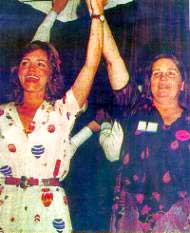
Sally Field, left, with
Crystal Lee Sutton.
By Martha Grevatt
Published Oct 10, 2009 7:41 AM
How many feature Hollywood movies can you name with the hero a rank-and-file woman worker who leads a successful union organizing drive against a powerful union-busting corporation?
Perhaps none come to mind, or you automatically think of “Norma Rae.” That 1979 drama earned Sally Field an Oscar for her portrayal of a cotton mill worker who stood up to the fictitious O.P. Henley mill owners. O.P. Henley represented the very real and viciously anti-labor J.P. Stevens Corporation.
Norma Rae’s character was based on a real working-class hero, Crystal Lee Sutton, who died in September at the age of 68.
In 1973, after working a variety of jobs, Sutton took a job packing towels at J.P. Stevens’ mill complex in Roanoke Rapids, N.C. Conditions were horrible. Illness-inducing cotton dust levels were 12 times higher than the maximum allowed by the Occupational Safety and Health Administration. Noise levels were 20 times OSHA limits.
Before the 1960s the Southern textile mills refused to hire Black workers. Even when companies like J.P. Stevens were forced to desegregate, they kept Black employees on the worst jobs. Women faced widespread discrimination and sexual harassment.
No wonder the Textile Workers Union targeted Stevens when, in 1963, it began a drive to unionize the Southern textile industry. At that time union mills in the Northeast were closing and moving to the unorganized South. Stevens had bought up numerous mills around the country—closing all of them that had a union—and was the second-largest manufacturer of towels, sheets, table linens and other household textile products in the U.S. Ten years after the drive began, none of Stevens’ 41,000 workers had won the right to union representation.
Sutton joins fight for the union
Sutton was immediately drawn to the union cause, signing a card despite her sister’s caution that she would get fired. Her spouse at the time objected to her attending a union organizing meeting at a Black church, but she went anyway. The Black workers were solidly behind the union, but Sutton saw she had a lot of work to win over the white workers. The events leading up to her being fired—and arrested—were accurately portrayed in the most famous scene in “Norma Rae.”
“The company posted a notice on the bulletin board, and it was, in effect, trying to scare people. It stated something like it was going to be an all-Black union.” TWUA organizer Eli Zivkovich insisted that Sutton copy down the wording of the flagrantly illegal notice and get it to him. (Victoria Byerly, “Hard Times Cotton Mill Girls”)
While the company was having a “safety dinner,” she went to the bulletin board and copied the posting. Management “took turns coming up to me telling me that I couldn’t copy that letter. If I did I’d be fired. Then the big man ... his name was Mason Lee ... told me that if I didn’t leave he was going to call the police. ... So I copied the letter and stuck it down in my bra.”
Later management took her into a room where she was told she was fired and would have to leave the plant. She insisted on getting her pocketbook first. When she got back to her worksite, she asked to borrow a worker’s magic marker.
“I took a piece of pasteboard and I wrote the word UNION on it and, for some reason, I don’t know why I did it, I climbed on the table and I just slowly turned the sign around. Everybody was in a state of shock and the machines started shutting down and everything got quiet. ... Then sure enough here comes the chief of police. Then he grabbed me and literally forced me out of the gate. ... He’s the one that shoved me in the cell and locked me up.”
Crystal Lee Sutton, like Norma Rae, became a full-time union activist. In 1974 the union won a representation election and was recognized at the Roanoke Rapids complex, but two years later it still didn’t have a contract. In 1976 an international boycott—its slogan was “don’t sleep with Stevens”—was launched. In 1977 the courts ordered Sutton and some 300 other Black and white workers to be reinstated with $1.3 million in back wages. Sutton went back to work for two days, then went back to full-time activism.
J.P. Stevens became a symbol of corporate resistance to the right of workers to have a union. The company was guilty of the most violations of the National Labor Relations Act since the its passage in 1935.
Union organizer’s final battle
In 1980 the workers at J.P. Stevens finally won a contract.
Crystal Lee Sutton never quit fighting for workers’ rights. She faced another battle when, after being diagnosed with cancer, it took two months to get the insurance companies to pay for needed medication.
In a 2008 interview, with her cancer advanced, she said, “It is not necessary I be remembered as anything, but I would like to be remembered as a woman who deeply cared for the working poor and the poor people of the U.S. and the world.” (Burlington Times News, June 28, 2008)
Now J.P. Stevens has closed all but one of its U.S. mills, shifting production to low-wage countries. However, the union-busting tactics that were its trademark are more widespread than ever. WalMart could be called the 21st-century J.P. Stevens.
Remember Crystal Lee Sutton! Demand the Employee Free Choice Act now!
Text
Articles copyright 1995-2009 Workers World. Verbatim copying and distribution of this entire article is permitted in any medium without royalty provided this notice is preserved.